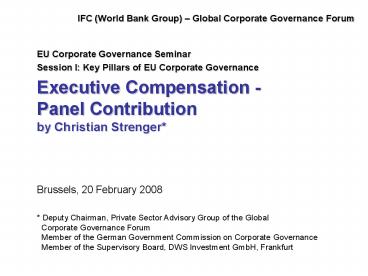Executive Compensation - Panel Contribution by Christian Strenger* - PowerPoint PPT Presentation
1 / 11
Title:
Executive Compensation - Panel Contribution by Christian Strenger*
Description:
Executive Compensation. The practical significance for companies ... The EU Commission's approach to executive compensation (1/2) ... – PowerPoint PPT presentation
Number of Views:183
Avg rating:3.0/5.0
Title: Executive Compensation - Panel Contribution by Christian Strenger*
1
Executive Compensation -Panel Contributionby
Christian Strenger
IFC (World Bank Group) Global Corporate
Governance Forum
EU Corporate Governance Seminar
Session I Key Pillars of EU Corporate Governance
- Brussels, 20 February 2008
Deputy Chairman, Private Sector Advisory Group
of the Global Corporate Governance Forum
Member of the German Government Commission on
Corporate Governance Member of the Supervisory
Board, DWS Investment GmbH, Frankfurt
2
Christian StrengerExecutive Compensation
- The executive compensation problem
- The practical significance for companies
- Excessive CEO compensation is in the US the
single most important litigation risk for
companies - In Europe attention to excesses in compensation
has grown sharply with social balance
ramifications
3
Christian StrengerExecutive Compensation
II. The EU Commission's approach to executive
compensation (1/2)
1. No common approach in the EU
- No EU-wide code of corporate governance
instead 27 different - codes
- Diversity of the EU leads to a problem for
multi national companies - Due to the specific market characteristics a
one-size-fits-all approach would be
counterproductive
2. The EU's approach to governance(-convergence)
(1/2)
- The EU's approach to governance is principle
based seeking the implementation of
basic governance aspects, leaving the detailed - application to the member states
4
Christian StrengerExecutive Compensation
II. The EU Commission's approach to executive
compensation (2/2)
2. The EU's approach to governance(-convergence)
(2/2)
- EU Commission adopted in 2004 a non-binding
'Recommendation' - on the remuneration of directors
- The key principles are
- Disclosure of the remuneration of individual
executives (incl. termination payments) - Disclosure of the remuneration policy (incl.
contract terms - for directors)
- Shareholders' vote on the remuneration policy
- (binding or advisory)
- Prior shareholder approval of share and share
option schemes
5
Christian StrengerExecutive Compensation
III. Main governance issues regarding the EU's
recommendation and other best practice principles
on executive compensation (1/6)
- EU Commissions recommendations on directors'
compensation have not yet met with the desirable
high level of acceptance - Major deficits regarding executive compensation
in the EU are
- Individual disclosure of executive remuneration
- Some European countries still only provide
executive remuneration as an aggregated
amount
6
Christian StrengerExecutive Compensation
III. Main governance issues regarding the EU's
recommendation and other best practice principles
on executive compensation (2/6)
Recommendation for improvement
- Fixed and variable compensation details of the
fixed and variable compensation
components - Variable compensation elements instruments to
be linked to appropriate performance
benchmarks - Long term incentives link between a director's
and company's performance to be disclosed - Other benefits to be disclosed in sum
- Positive examples France and UK
7
Christian StrengerExecutive Compensation
III. Main governance issues regarding the EU's
recommendation and other best practice principles
on executive compensation (3/6)
2. Disclosure of the remuneration policy
- Commission policy is followed only by about 60
of the EU Member States
- Important aspects for the disclosure of the
remuneration policy - Setting and disclosure of relevant criteria
- Immediate execution of share options when
executives leave a company - Positive examples France and UK
8
Christian StrengerExecutive Compensation
III. Main governance issues regarding the EU's
recommendation and other best practice principles
on executive compensation (4/6)
3. Shareholder vote on the remuneration policy
an uneven picture
- EU Commissions recommendation on a shareholder
vote on the remuneration policy as a whole
is hardly accepted
Positive examples Spain, Netherlands, Belgium
(not fully implemented)
- The British way- non binding shareholder vote
- The GM must include a resolution approving the
Directors' - remuneration report but not individual
compensation
9
Christian StrengerExecutive Compensation
III. Main governance issues regarding the EU's
recommendation and other best practice principles
on executive compensation (5/6)
4. Adequate compensation structures
Key aspects are
- Necessary link to long-term profitability and
individual success - Share based compensation must be a substantial
part of the - compensation package
- Supervisory boards must avoid excessive share
based compensation - Avoidance of 'pay for failure' by appropriate
length of employment contracts - Avoidance of excessive severance packages
10
Christian StrengerExecutive Compensation
III. Main governance issues regarding the EU's
recommendation and other best practice principles
on executive compensation (6/6)
5. Compensation committees necessary to achieve
equitable solutions for executives and
investors
- Widely implemented key challenge improvement
of - committee quality
- European average 95 of companies have a
compensation - committee - however only 40 of the DAX
companies - Oversight of executive pay programs to be
executed by - directors with appropriate skills, knowledge
and experience
11
Executive Compensation -Panel Contributionby
Christian Strenger
IFC (World Bank Group) Global Corporate
Governance Forum
EU Corporate Governance Seminar
Session I Key Pillars of EU Corporate Governance
- Brussels, 20 February 2008
Deputy Chairman, Private Sector Advisory Group
of the Global Corporate Governance Forum
Member of the German Government Commission on
Corporate Governance Member of the Supervisory
Board, DWS Investment GmbH, Frankfurt































